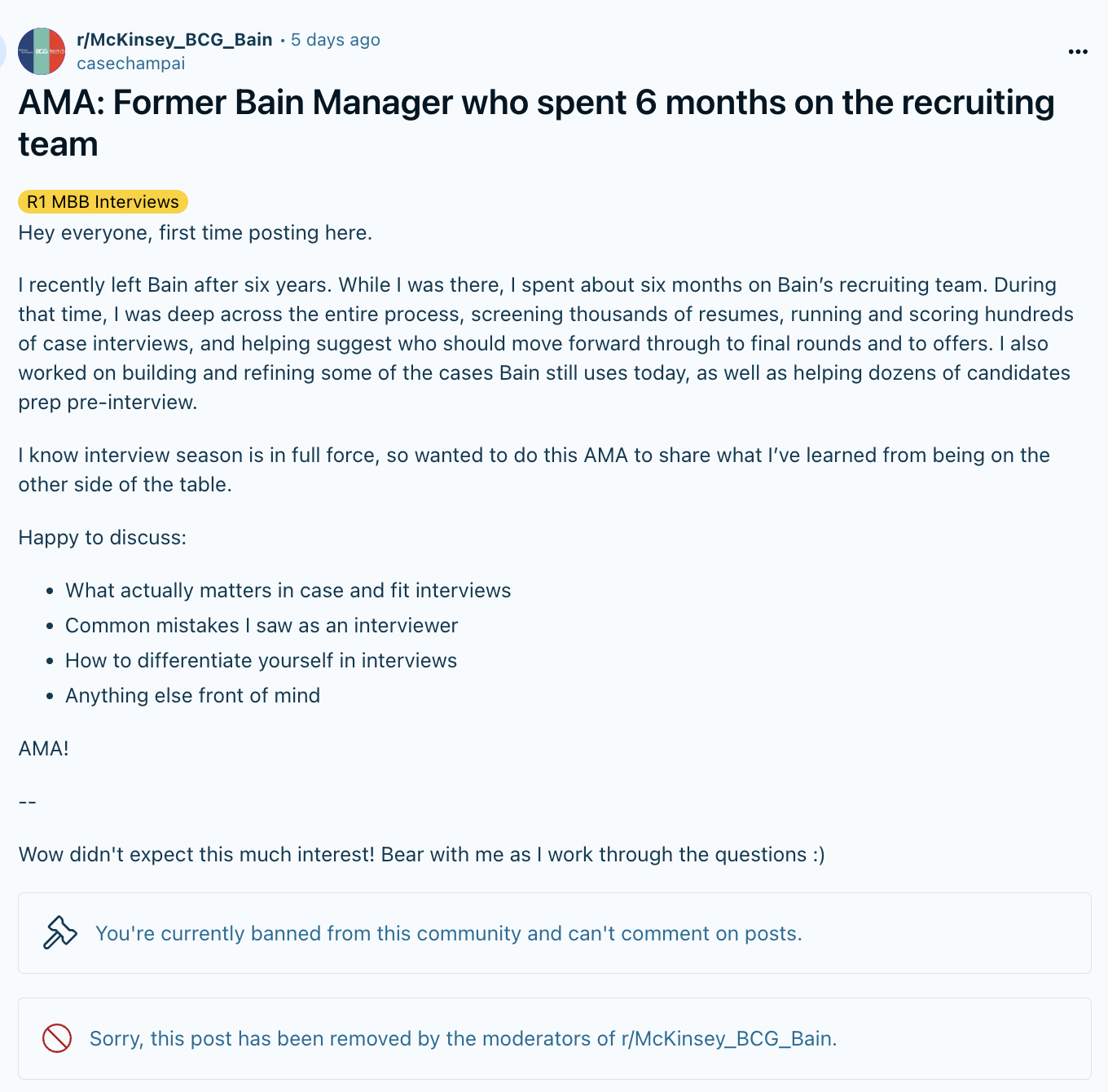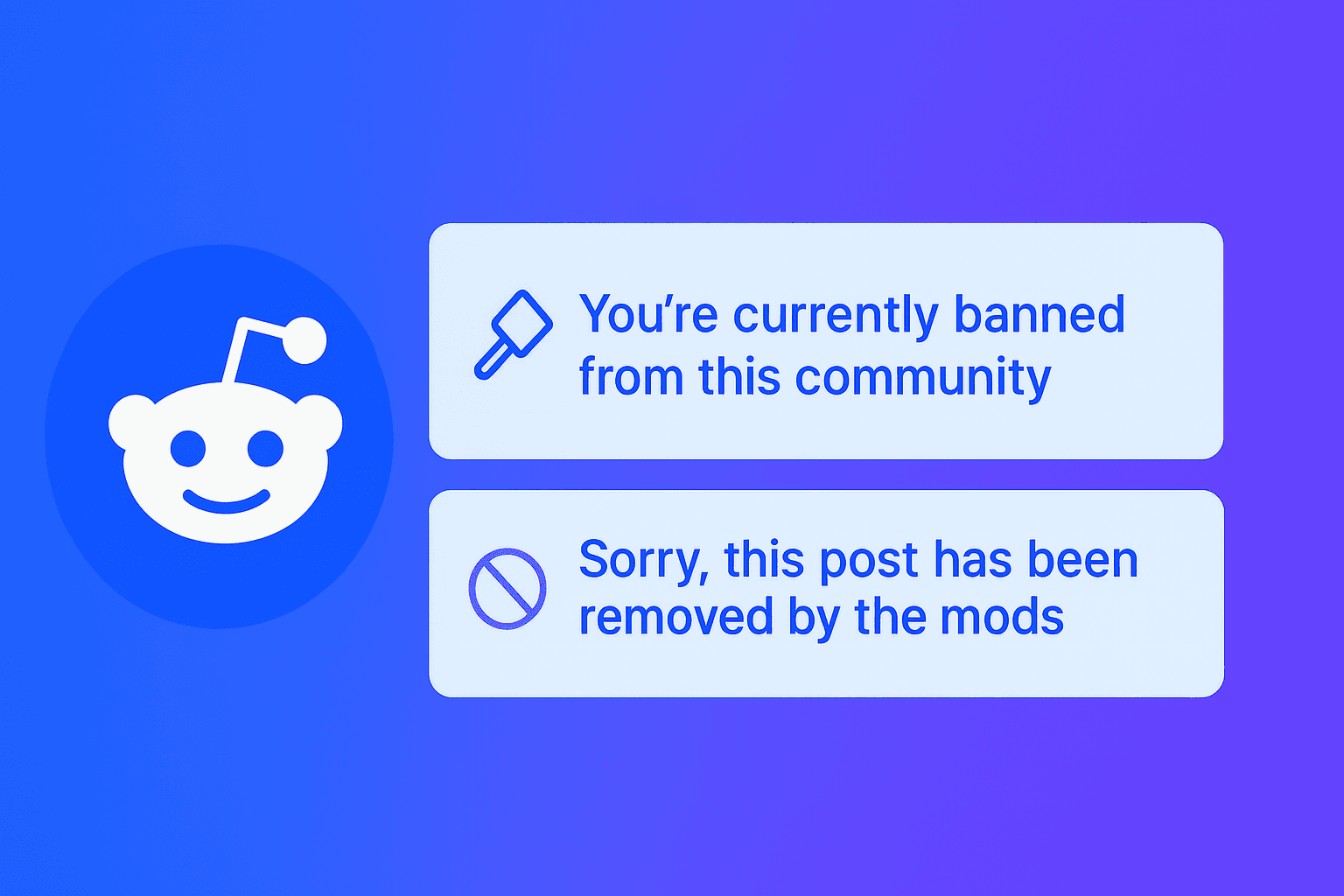Ana
Co-Founder, CaseChamp.ai
A few days ago, I opened an AMA on Reddit to share what I'd learned from six years at Bain, including a six-month rotation on the recruiting team. The post blew up…then moderators yanked it and banned me from the sub for 999 days for no good reason. Rather than let the advice disappear, I'm publishing the key exchanges here.
Below you'll find the original Q&A, verbatim (lightly formatted for readability).

Resume Screening
I think the biggest differentiator is clear evidence of success in the things you've chosen to do. That could mean leadership in a major student club (although that's much more common), I think what's less common are things like starting a side hustle that gained traction, excelling in a sport, or something less traditional. For example, a friend of mine at Bain worked full time through college and didn't have much in the way of extracurriculars, but had strong examples of projects that they ran independently that drove real revenue for the business. That kind of achievement really stands out, and my advice there is just to try to solve for where interests naturally take you and make the most out of that, rather than doing a bunch of things because you think you should be.
On top of that, two things are just threshold: one, there's no substitute for top grades. Consulting attracts a lot of really smart people, and MBB has their pick of the bunch, so all things equal, it makes sense that they'll solve for that given they can. Two (to be clear, this is more my POV so take with a grain of salt) I think that rigor of your major will increasingly play a role. And you don't need to design your whole degree around consulting, but increasingly clients are coming to consulting firms with more rigorous analytical work (financial modelling, cutting large datasets, AI/technical work etc.), so IMO majors that are more analytical / quantitative (e.g., engineering, economics, math) will probably be more demanded — especially if you crushed it from a grades perspective.
Non-business backgrounds are absolutely considered competitive — at both the undergrad and post-grad level, there's no disadvantage as long as you meet the basics like strong grades and problem-solving ability. At the post-grad level, there are also specific pathways for people who don't have MBAs (e.g., Bain has a program called ADvantage; other firms have similar programs).
To help contextualize this, generally, this is because the firms like having a mix of perspectives and experiences, and also because you have a diversity of project types and industries, and so it's important to have a mix of competencies. Especially over time it's important to have some people who spike on working with clients vs. spike in really quantitative work vs. are more systematic thinkers who can be really strong at structuring vs. people who index on creativity / novelty.
Interviews
Differences between R1 and R2 are pretty minimal (in my experience, so take with a grain of salt). MBB firms really care about providing a consistent experience, so they're not trying to make R1 vs. R2 wildly different. Every case you get, whether R1 or R2, should mix qualitative and quantitative elements (the qualitative side is testing how structured and creative you are, and the quantitative is about how logical and reasoned you are). I think any difference people end up perceiving will largely be natural variation (e.g., maybe in R1 you got an industry you're familiar with as a customer, but in R2 you got a B2B industry but that was just luck of the draw rather than deliberate). So I wouldn't worry too much about trying to prepare differently.
As for standing out, two big things in my opinion:
- Make it feel like a conversation, not an interrogation. Yes, you'll be doing most of the talking, but the best candidates come in curious and excited to solve a problem rather than tense and overly rehearsed. The best interviews for me were the ones where it felt like a smart back and forth.
- Show that you "get it" / have really understood the problem (if there are things you don't get upfront, I promise you, it won't get better later on in the case, so you should invest at the start to really make sure you understand the context). The people who stood out to me were the ones who took a second to contextualize the industry and focus on what really mattered, and they'd pull in real-life examples or draw parallels. And I think this is possible even if you know very little — e.g., if you get a case about a B2B industrial supplier and you've never worked in that space, you could draw from context elsewhere: "This reminds me of when a major consumer brand like Nike faces distribution challenges. I know they tend care about reliability, speed, and cost efficiency, and I imagine the same priorities apply here for B2B Co."
Good raise — I think this is more about it sounding conversational rather than overly professional (because to your point, you'll be doing most of the talking). I think what I really mean is 1) sounding like a human / not being overly professional, 2) feeling okay to make a funny comment / laugh if relevant or appropriate. I think both of these can be achieved by not trying too hard to be verbose or "sound smart." Will give an example below to contextualize what I mean.
And as to how you actually do this, I think in general I would practice interviews like you are practicing speaking to a peer in a professional-ish context. I also mentioned this in another response, but the single most high-leverage thing I'd recommend is recording yourself answering questions and then listening back, which is unbelievably effective IMO. You'll likely need to calibrate a bit (i.e., you'll probably swing to sounding too casual and will then need to find a happy medium, but this is par for the course).
- Conversational: "So, I'd probably break this down into three buckets: sizing the market, looking at the competition, and then looking into our own capabilities. Pretty standard, I know, but it works. [laughs] Let's start with sizing the opportunity — I think this'll be the most important because it won't make sense to do the others until we have a grasp on if this is attractive enough to go after."
- Overly Professional: "My approach will be structured into three distinct areas: market sizing and conditions, competitive landscape, and internal capabilities. I will begin with an analysis of overall market attractiveness before moving on to competitive benchmarking and internal assessment. Given the importance of market size in determining overall feasibility, I will prioritize assessing the opportunity first, as subsequent analyses would be less meaningful without confirming its attractiveness."
If I only had a weekend, there's a few things I'd prioritize. One, the best thing you can do is run actual cases. That can be with a partner, an online simulator (we'd obviously recommend ours), or even just practicing questions on your own (when I was preparing years ago, I'd take case books and be super diligent about forcing myself to really walk through it step by step without looking forward).
While doing that, the single most high-leverage thing I'd recommend is recording yourself answering questions and then listening back (which 90%+ of people don't do). It's hard to know what you actually sound like in the moment, and hearing yourself lets you catch things like, am I speaking in a clear, cohesive way? Do I sound too rigid or overly "interview-y"? A lot of people could benefit from making their answers feel more like a smart conversation rather than a very rigid interview.
The second thing I'd do, if you have time (although I'd suggest for this to be no more than 20-30% of your time) is to spend an hour or two reading good business news — I personally read the Wall Street Journal, and started when I was a student (they have a deal that's less than $5 a month from what I remember). Just skim what's happening in big sectors like retail, fast food, etc. Having that baseline knowledge and being able to pull in real-life context really helps on the rigidity piece I mentioned above.
The interview is really designed to test for the things that predict success in the actual job. At its core it's: Are you smart, curious, and able to think critically, often on the fly? None of this is especially revolutionary, but after multiple years on the job I saw that the people who excelled were exceptional at:
- Breaking down and structuring messy problems
- Finding insights that aren't obvious, then pressure-testing them
- Chaining first-level insights to second- and third-order implications
- Communicating the logic so teammates and clients trust the thinking
In practice you're constantly sense-checking your work: "Does this ratio make sense? If margin is down two points, what does that mean for free cash flow? What does that mean for headcount?" That recursive, implication-driven mindset is exactly what the case is meant to mimic.
Common mistakes: treating the case like a memorization quiz, jumping to math before framing the problem, and hiding errors instead of flagging and correcting them. Interviewers care far more about your real-time reasoning than a perfect final number.
My best mindset tip is to try to see the case as a chance to solve an interesting business puzzle alongside a future teammate, rather than a performance where every word is graded. Easier said than done, but the candidates who adopt that frame usually relax, and end up performing better.
Thanks for reading. If anything here sparks a question, reach out at hello@casechamp.ai. I'm always happy to dive deeper and do another one of these with some of the questions I didn't get to in the AMA.
Ready to ace your case interviews?
Practice with AI-powered mock interviews designed by former MBB consultants
Start practicing for free


